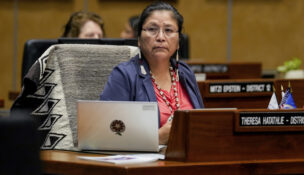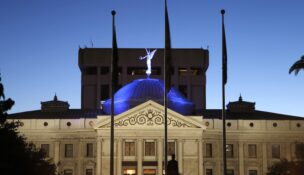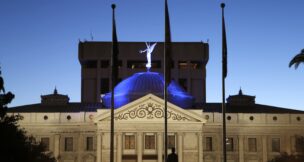Schweikert considers bid for Arizona governor
Jakob Thorington Arizona Capitol Times//August 22, 2025//
Schweikert considers bid for Arizona governor
Jakob Thorington Arizona Capitol Times//August 22, 2025//
Key Points:
-
US Rep. David Schweikert mulls running for GOP nomination for governor
-
Congressman’s chances, motive are questioned
-
Crowded Democratic field lines up in CD1 to challenge Schweikert
Arizona Congressman David Schweikert is considering entering the state’s gubernatorial race. If the decision is made official, he would join a crowded GOP lineup and vacate a congressional seat in one of the nation’s most competitive districts.
Schweikert’s political consultant Chris Baker told Punchbowl News, a nonpartisan outlet that covers Congress, that Schweikert is mulling his chances in the race and will make a decision by the end of the month.
A declaration to run would shake up a primary now headed by two frontrunners, U.S. Rep. Andy Biggs and Karrin Taylor Robson, and add a new element to the Arizona GOP’s bid to challenge Democrat Gov. Katie Hobbs.
Some are not convinced Schweikert will make an official declaration.
“I can’t imagine him doing that,” said GOP consultant Chuck Coughlin. “I don’t see that as being a significant play … What lane would he fill?”
Schweikert’s campaign didn’t return a request from the Arizona Capitol Times for comment.
After his first election to Congress in 2010, Schweikert has been Arizona’s longest-serving congressman. However, the 1st Congressional District he represents has only grown more competitive throughout his career. His seat has been heavily targeted by Democrats, and although he defeated Democrat Jevin Hodge in 2022 by less than 1% of votes and carried a greater margin of victory of nearly 4% against Amish Shah in 2024, his advantage remains slim.
Arizona Freedom Caucus Republicans have expressed support for Biggs in the governor’s race. The group’s founder, Sen. Jake Hoffman, R-Queen Creek, wrote in an Aug. 18 X post that Schweikert running would put a vulnerable House seat at risk for Republicans.
“Schweikert can barely win his own House seat,” Hoffman wrote. “He’ll never win a statewide general (election).”
Congressional Republicans are attempting to hold on to their majorities in the U.S. House in the 2026 midterm election, and midterm elections have historically seen the White House’s majority party lose seats.
Coughlin said Schweikert’s strategy to tease gubernatorial candidacy could be an attempt to negotiate for something in Congress.
Shah, a former Democratic representative in the state House, is running again to challenge Schweikert. His campaign has already jumped on Schweikert’s consideration for governor as an opportunity to raise funds in text messages from the campaign on Aug. 18.
“(Schweikert) knows he can’t defend his record against a strong Democratic challenger like Dr. Amish Shah,” Shah’s campaign wrote. “When he shows up, Schweikert keeps voting for policies that hurt working families — from the ‘Big Ugly Billionaire Bill’ that slashed Medicaid and raised health care costs, to an agenda that drives up inflation and strains Arizona’s rural hospitals.”
Only one Republican other than Schweikert, Brandon Sproles, has filed a statement of interest for the GOP nomination in CD1 by Aug. 20.
By contrast, twelve Democrats have filed statements of interest to try to win the Democratic nomination and challenge Schweikert, including Shah and Marlene Galán-Woods, who lost to Shah in the 2024 Democratic primary race.
Other Democrats who are considering running in the district include Andres Barraza, the former Tempe Union High School District governing board president who recently gave up his leadership position to focus on his congressional run; and voting rights activist and attorney Mark Gordon Robert.
Democrats have lost some ground in voter registration in CD1 since 2022, according to registration statistics compiled by the Secretary of State’s Office.
During Schweikert’s narrow victory over Hodge in 2022, 37% of voters in the district were registered as Republicans, while about 33% were “other” and 28% of voters were registered Democrats.
The most recent voter registration statistics from July 2025 show 38% of voters are registered Republicans, while registered Democrats have fallen to 26%. And 33% of registered voters are other and the No Labels, Libertarian and Green parties have less than 1% of voters for each party.














































